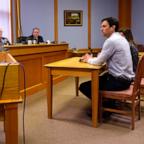Sex, Money & Videotape: Making Billions on Reality TV
N E W Y O R K, March 7 -- Civilization might have been better served if, on that fateful evening in 1997, John de Mol had just called it a night and gone to sleep.
But he couldn't stop brooding about television. It was close to midnight, at the end of a long and fruitless brainstorming session, when someone had mentioned Biosphere 2 — the American media stunt that locked four men and four women in a giant glass bubble in the desert for two years. At 5 a.m. the next morning, De Mol had his inspiration.
"I was hypnotized," recalls the handsome Dutchman, 47. He runs a TV production company called Endemol (the pharmaceutical-sounding name comes from the 1994 merger with a Netherlands rival, Joop van den Ende).
"I suddenly started wondering what would happen if you put a bunch of boys and girls together in a house and put them on television 24 hours a day." He can't claim to have invented the idea; MTV's Real World was already on the air. But he milked it better.
After a year of secret work De Mol created a show called Big Brother, in which 24 TV cameras trained on a group of young, good-looking men and women cooped up in a house for 100 days. Aired in Holland in September 1999, it arrived just when the world was ready for a new kind of boob-tube content: reality TV.
Love it or loathe it, this kind of show has fundamentally changed how television operates — and made John de Mol a very rich guy.
Show Me the Money
What's novel about such programming has little to do with scraping new lows in entertainment. Televised displays of greed, lust, scheming and humiliation have been around since Queen for a Day in the 1950s and the Newlywed Game in the 1960s; public television's on-camera vivisection of the dysfunctional Loud family in the 1970s was another early example of the genre.
The revolution is as much economic — especially in the United States. Along with Endemol's Fear Factor, shows like Joe Millionaire and American Idol (both non-Endemol productions) are drawing much higher ratings than a lot of standard prime-time fare, giving lineups a good shakedown.




